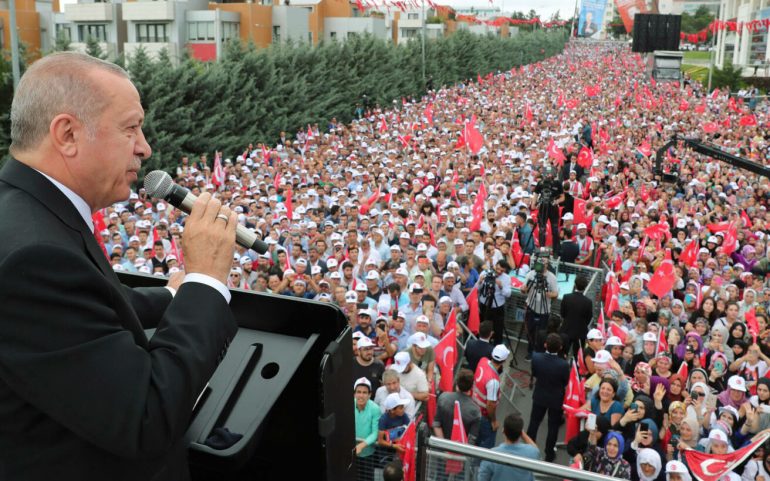In March 2018, the "Washington Post" published a lengthy article entitled "Erdogan turns Turkey into a totalitarian regime". In it, the oldest newspaper in the American capital and one of the largest in circulation in the world, mentions, among other things, that the president of our neighboring country managed within a few years to turn a troubled democracy into a dictatorship.
He jailed political opponents, criminalized freedom of expression, turned Twitter into a crime, and sent dozens of journalists to penitentiaries with unacceptable conditions for violating any notion of human rights.. "Gradually but relentlessly, a nation that once aspired to become a model of enlightened moderation is being transformed by Mr. Erdogan into a sad prison of totalitarianism," the columnist said.
Erdogan, 66, is the most enigmatic politician to emerge in Turkey's 97-year history. He is at once authoritarian and paternal, polarizing and popular, predictable and vague. He once snatched cigarettes from citizens to persuade them to quit smoking, and in 2009 he angrily left the panel of the Annual Economic Forum in Davos, Switzerland, after a heated confrontation with Israeli President Simon Peres.
On the other hand, he had the patience to wait 16 years until he forged the so-called "new Turkey", an economically self-sufficient and self-sufficient country (at least for the first time), with a marginalized opposition and a controlled press, which increased influence in the eastern Mediterranean. and was more involved in conflicts in burning areas such as Syria and northern Iraq, consciously moving away from the European Union and in part from the North Atlantic Treaty Organization doctrine. But how did he get to the point of described as a "paranoid dictator" even by his compatriots such as the Boston Celtics basketball player Enes Kader who has been living in the United States for years as both he and his family are wanted by the Turkish regime?
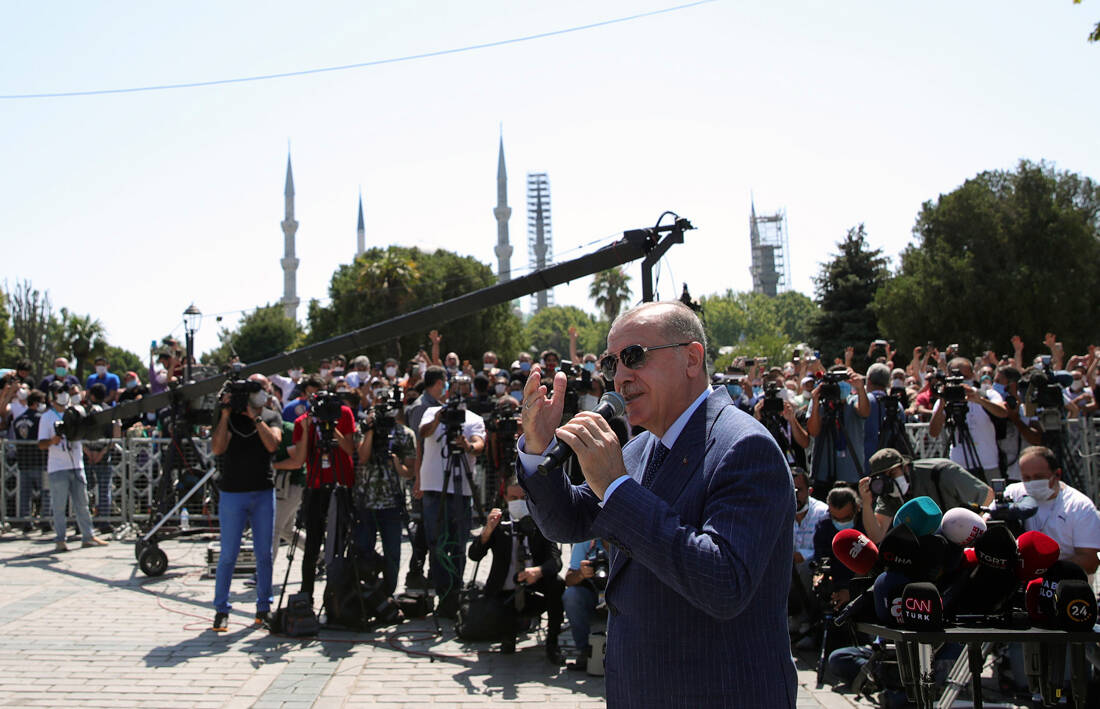
Ο Erdogan was born on February 26, 1954 in the Kasimbasa district of Istanbul. In addition to his studies at one of the religious secondary schools, he was forced to work doing various street jobs in order to secure more money for himself and his family. Among other things, he sold buns and lemonades.
In his youth, however, he was also a football player. He started with the local team Kasimpasa Sport Kouloumbou in Istanbul where he grew up, and according to Turkish media, Fenerbahce wanted to offer him a contract but his father did not let him. So for history, today the stadium of Kasisbasa bears its name (Recep Tayyip Erdoğan Stadium).
During his student years (he studied business administration at the School of Economics and Business in Aksaray, Cappadocia) he joined the anti-communist National Turkish Student Union and later became a member of the National Salvation Party. In September 1980, another military intervention took place in Turkey in the political life of the country. General Kenan Evren overthrows the government of Suleiman Demirel. At that time in the opposition was Necmettin Erbakan (who was supported by Erdogan) who was arrested and held in Izmir. A few weeks later, he will be "officially" imprisoned on the charge of acting against the secularization of the state, which is one of the principles of Ataturkism.
Following the coup, Erdogan and his Erdogan supporters joined the Islamic Welfare Party, with which he also participated in the local council of Istanbul's Beyoglu district. He will deal even more actively with the local government and in March 1994 he will be elected mayor of Istanbul with a small percentage of 25,19%. He was just 40 years old at the time and a rising member of the Islamist party. It is said that whoever wins Istanbul, later wins Turkey, so next was enough to anticipate that Tayyip would be the successor of Necmettin Erbakan, who is prime minister from 1996-1997.
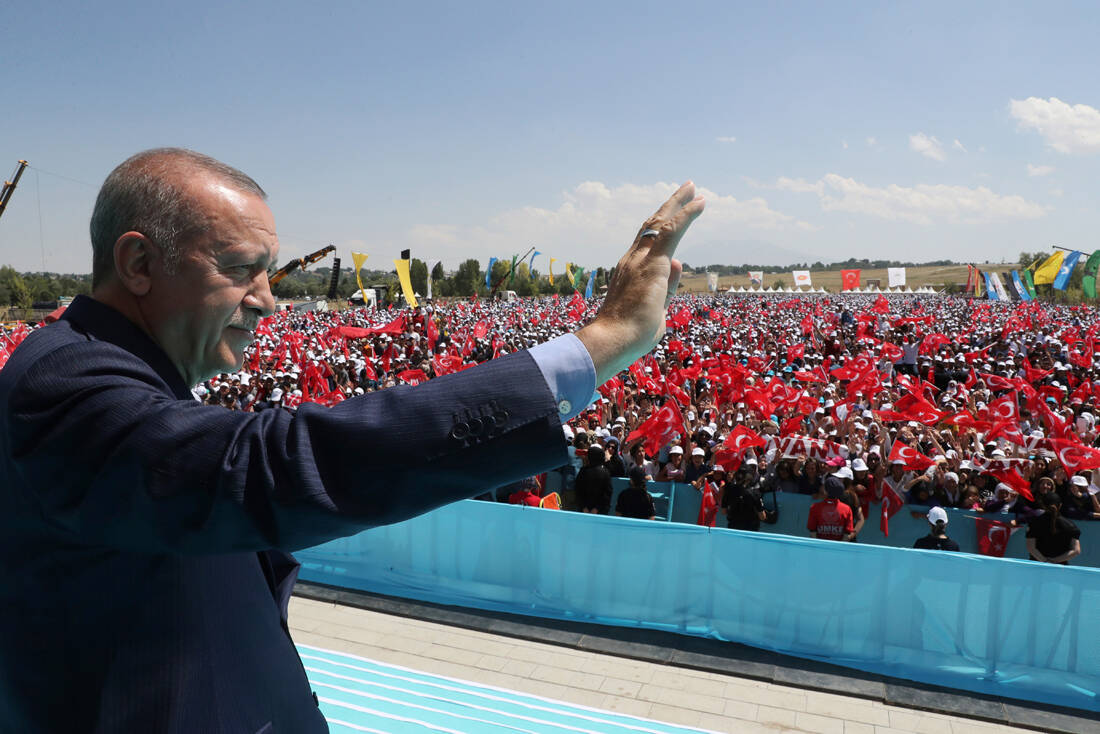
In April 1998, however, Mayor Erdogan was sentenced to 10 months in prison. The offense was that four months earlier, in a speech in Sirte, he had recited a poem by the 3rd-century Turkish nationalist poet Ziya Gokalp that incited the religious and political half. "The mosques are our barracks / the domes are our helmets / the minarets are our bayonets / and the faithful are our soldiers," said one of the most characteristic verses. He is forced to resign from the mayor's office and his political rights are taken away for as long as his sentence lasts.
The next big political station will be with the parliamentary elections of November 2, 2002, which he wins as leader of the Justice and Development Party (AKP). However, he could not be a candidate for MP because the removal of his political rights remained in force. Thus, on November 18, 2002, his close associate Abdullah Gul was initially appointed Prime Minister, who remained in the presidency for four months until Erdogan was elected to Parliament in March 2003 through repeat elections held in Sirte, in order to overthrow him. .
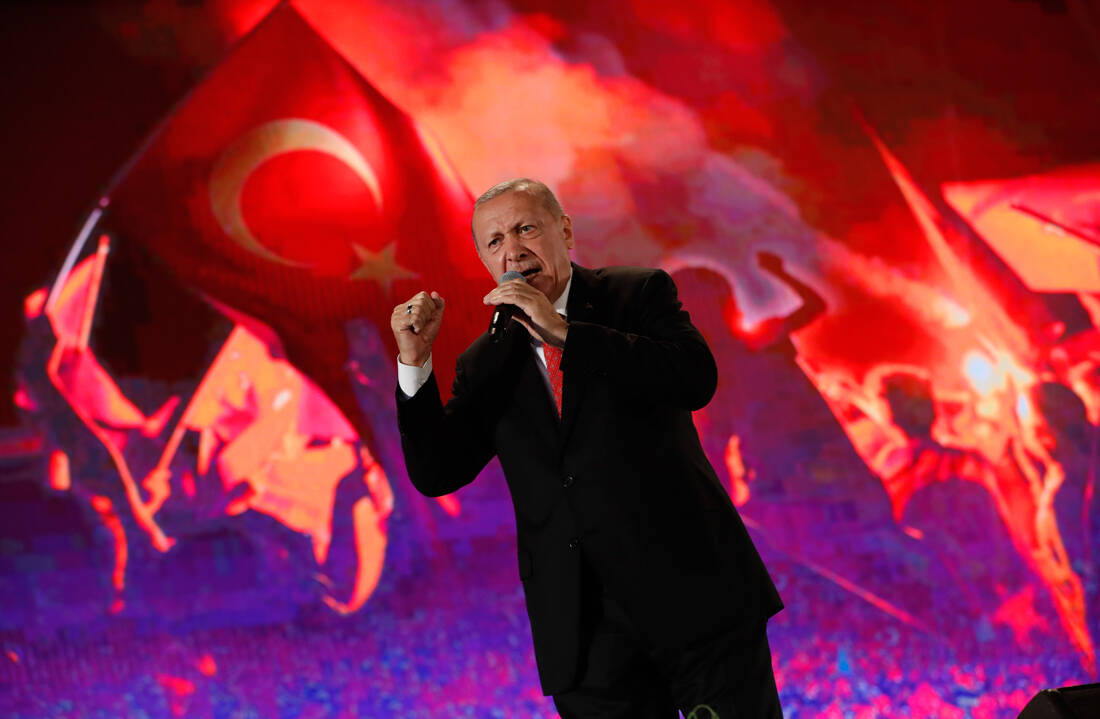
It is worth noting that on November 17, 2002, one day before Gul was sworn in as Prime Minister, Tayyip Erdogan visited Athens and met with then Greek Prime Minister Costas Simitis. The two men's talks focused on Greek-Turkish relations and the Cyprus issue, as the Annan plan to resolve a major national issue was being discussed at the time. The aim of the later "sultan" was to amuse Europe's fears of an Islamic party victory in a country seeking to join the Union. Mr. Simitis was willing to contribute to this, seeking in return Ankara not to create problems in the process of Cyprus' accession to the European Union because the Cyprus issue had not yet been resolved and the Greek-Turkish disputes to be settled by appealing to the International Court of Justice in The Hague - regardless of whether this was canceled later.
The Greek-Turkish approach will continue with both Costas Karamanlis (who in July 2004 witnessed the civil marriage of Erdogan's eldest daughter, Esra), and George Papandreou. In the meantime, the neighbor's leader has managed to win the national elections (July 22, 2007) with 46,54% of the vote.
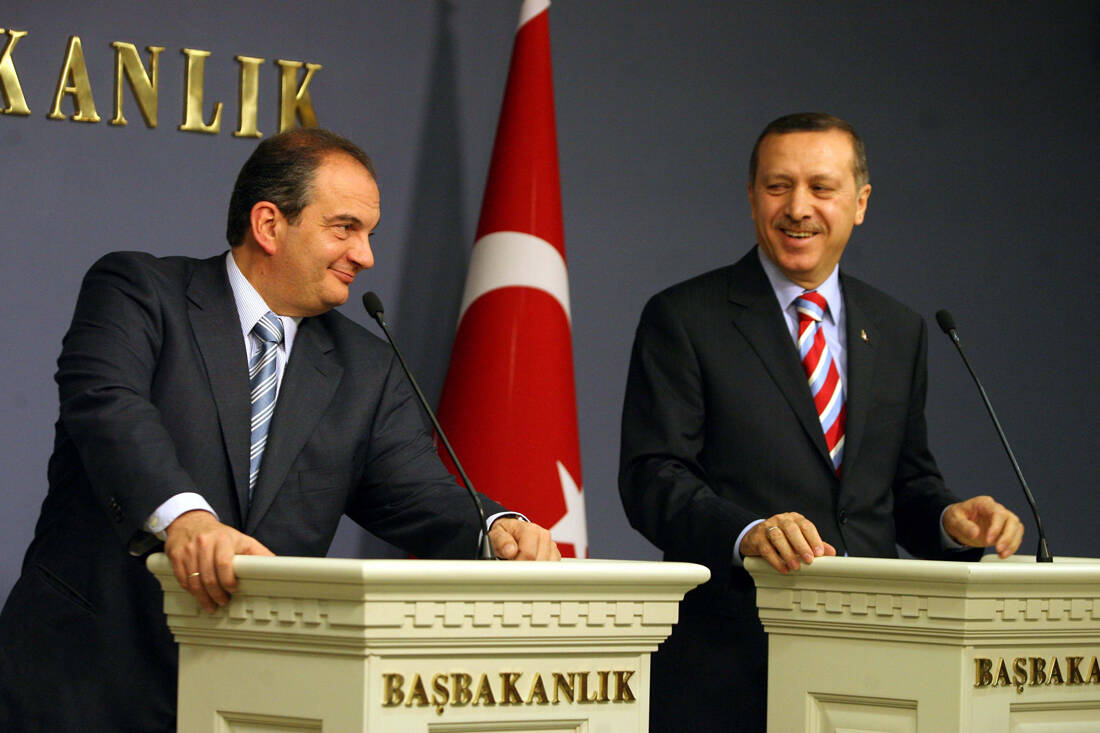
Undoubtedly, in the first decade of his rule, the Turkish president sought to maintain good relations with our country. The interpretation given, however, is that as an Islamist, he could not largely control the army and the deep state. A wrong move could lead to his overthrow from within. In addition, he wanted to show a good face abroad, as he sought his country's accession to the European Union - he would later change his mind.
The transformation that will turn him into a "dictator" will begin with the failed one coup of 15 July 2016. That night a section of the army carried out the plan to overthrow the government. A total of 265 people will lose their lives and many more will be injured. In Ankara, the Turkish Parliament and the Presidential Palace were bombed as coup plotters allegedly tried to arrest Erdogan, who was at a hotel in Marmaris that day, but were unsuccessful. Through a video call from his mobile phone, he spoke on television and called on the people not to obey the coup plotters, while military forces loyal to the government were gradually taking control. Erdogan will blame Fethullah Gulen, an imam and writer who used to be his ally. At the same time, it will be concluded that Europe and the United States conspired against him.
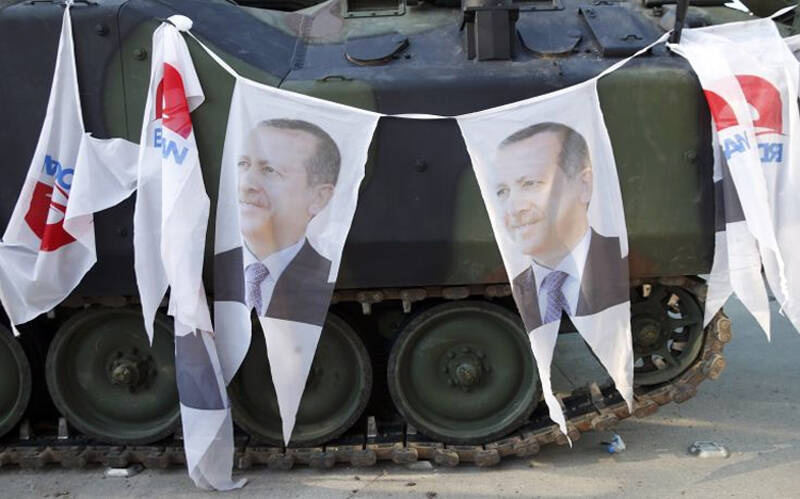
Even today, questions are raised about this coup, with the scripts even talking about its orchestration by the Turkish president himself. What is certain is that after this Erdogan became stronger, finding the opportunity to imprison his political opponents, to proceed with the purge of the army and to dismiss thousands of civil servants who he thought had some involvement in the illegal actions against him.
It is noteworthy that by July 19, 20.000 military, police, and judicial officials had been arrested or deported., banned the religious ceremony at the funerals of the dead coup plotters and the operation of television stations that it considered to be close to the perpetrators of the near dictatorship, dismissed 15.000 employees of the Ministry of Education (including 1.577 rectors of universities and private schools). Two weeks later, the prosecution was extended to football referees. In the West, more and more people are starting to talk openly about a staged coup attempt aimed at strengthening Erdogan's dictatorship.
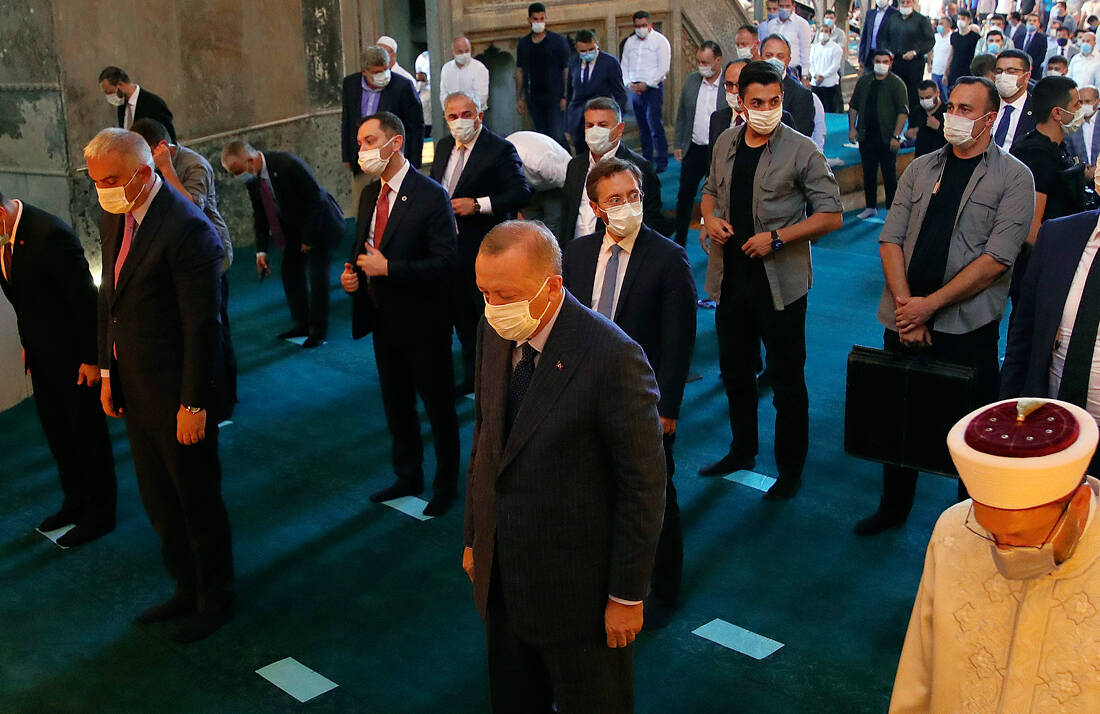
With the constitutional referendum On April 16, 2017, the office of the Prime Minister of Turkey is abolished and all powers are transferred to the President of the country. All the highest state positions were now concentrated in his face. Even before winning the presidential election on June 24, 2018, he begins to raise the issue of revising the Lausanne Treaty, talking about a "Blue Homeland" and sovereign rights of Turkey that are being violated, promises land expansion and now lives in a presidential palace, the construction of which cost half a billion euros, as it has over 1.000 rooms and covers an area of 300.000 square meters. Its luxury is beyond imagination. "It is a symbol of Turkey's growing power in the region," he said.
Tayyip Erdogan envisions becoming the "new Kemal Ataturk" and has now set the 2023 presidential election as a milestone, coinciding with the 100th anniversary of the founding of the Turkish state that emerged after the Treaty of Lausanne. Until then, he imagines that he will have managed to strengthen his country even more and that he will celebrate the anniversary with pharaonic-sized national and nationalist events. In order to succeed, however, it must overcome the political damage it has suffered and stop it slump of the Turkish pound and the economy in general, something that just does not seem easy.
